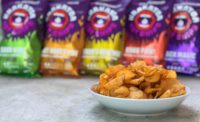While myriad types of corn and flour tortillas continue to dominate sales, the tortilla market has changed over the years to accommodate varying consumer preferences, with gluten-free, grain-free, veggie and flavored options gaining favor. Such innovation will continue to diversify the tortilla industry moving forward.
Overview | Bread | Tortillas | Sweet Goods | Snack Cakes | Pizza | Desserts | Cookies | Buns & Rolls | Bars | Breakfast Products
Market data
According to data from IRI, Chicago, over the past 52 weeks ending on March 19, 2017, hard and soft tortillas, including taco kits, are up slightly, by 2.22 percent, accounting for about $2.4 billion in sales. Mission Foods, a subsidiary of tortilla giant Gruma Corp., continues to dominate the category, with over 30 percent of market share and dollar sales up 4.68 percent to $739.9 million in sales. Mission saw a nice gain for its Carb Balance line of better-for-you tortillas, up 14.39 percent to $84.5 million.
Gruma Corp., representing its other tortilla brands, also sits in the No. 2 slot in tortillas and took in $395.8 million in sales, up 1.61 percent for the period. Gruma’s Guerrero brand saw an increase, up 3.41 percent to $370.6 million.
While Olé Mexican Foods has a primary focus on its traditional La Banderita tortillas, which were up 1.79 percent to $178.2 million, its Olé Xtreme Wellness line of high-fiber, fat-free and multigrain products, as well as Spinach & Herbs and Tomato & Basil options, grew by 30.13 percent to $27.2 million.
The refrigerated tortilla/wraps segment is home to select ready-to-cook products— often partially cooked, ready to finish at home, for a fresher, more speed-scratch approach. Overall, sales were down by 5.53 percent to $99.8 million, but segment leader Circle Foods and its signature Tortilla Land line saw growth of 12.25 percent, up to $27.6 million in sales. La Abuela Mexican Foods also experienced a dollar sales increase of 9.32 percent to $7.5 million in sales.
Another bright spot was Gruma’s refrigerated Guerrero line, which saw significant growth, up 157.60 percent to $4.7 million.
Looking back
What consumers want, consumers will get, and brands will scramble to fulfill their desires on the shelf.
“The desire for healthy options continues to drive growth in the tortilla industry,” says Tim Romero, product sales manager, Taconic, Petersburgh, NY. “When consumers demand healthy products made of whole wheat or whole grains, and wraps that meet dietary restrictions, manufacturers need to respond with products made from alternative ingredients.”
More better-for-you alternatives, including gluten-free and grain-free, continue to hit the tortilla market. In August 2016, Siete released a Cassava & Chia grain-free tortilla, made with a blend of coconut and avocado oils—a formulation aspect clearly indicated on front-of-pack messaging. The tortilla is also gluten-free and Paleo-friendly.
In July 2016, Potillas released gluten-free, Non-GMO Project Verified sweet potato Potapas, also formulated with white potatoes, garbanzo bean flour, cassava flour and chicory root. That same month, Kontos Foods released gluten-free wraps, suitable for foodservice, measuring 12-inches in diameter.
“An emphasis on non-GMO, gluten-free, vegan, Paleo, and other specialty diets have become more prevalent,” says Shawna Campbell, marketing specialist, Wire Belt Co. of America, Londonderry, NH. “Even consumers who aren’t necessarily on a specialty diet are more likely to pick up a product with these labels because they are generally seen as being ‘better for you.’”
Better-for-you has become indoctrinated into our food culture as a whole. “In today’s environment, healthy options are a driving force,” says Campbell. “Tortillas are following that trend with multiple options to meet consumer demand. From whole wheat to whole grain, the market is continuing to evolve.”
Looking forward
Street tacos will continue to grow in popularity, opening new opportunities for downsized tortilla formats.
The popularity of street tacos comes as no surprise, notes Tom Nist, vice president, sales and marketing, Fresca Mexican Foods, Boise, ID. “They allow restaurants to have lots of culinary creativity, manage costs with smaller portions and provide customers with exciting new flavors.”
Brands that are perceived as more “authentic,” and that have been in the market for a long time, will continue to flourish.
“Consumers—and millennials, in particular—seem to prefer authentic or homemade tortillas,” says Campbell. “Consumers prefer brands that have been passed down from generation to generation, with simple, natural ingredients. On the flip side, new and exotic flavors and ingredients also continue to be on the rise.”
Clean, clear labels will continue to gain followers, something Fresca Mexican Foods—which employs a proprietary freezing process for its clean-label tortillas to preserve freshness—has experienced firsthand.
“Fresca introduced a new line of Non-GMO Project Verified tortillas,” says Nist. Customer feedback centered on the welcome surprise that a tortilla could be both truly clean-label and soft and pliable. “We are launching with a large national chain in July with this product and have many other customers testing it. We expect the clean label trend to continue.”
Tortillas also continue to find appeal across every daypart. “Tortillas have found a place on breakfast and lunch menus in all types of eateries, including quick-service restaurants,” comments Romero.
And as tortilla ingredient selection expands, equipment, too, needs to adapt. “Tortilla press belts become a more critical factor in tortilla production when different ingredients like grains and vegetables enter the mix,” says Romero. “These dough types may be more difficult to process, as they may be more abrasive and stickier. Press belts specifically designed to offer abrasion resistance and optimum release properties will provide better durability in these applications.” He’s quick to note that operational efficiency can be dramatically increased with the right press belt.
Campbell notes that Wire Belt’s Compact-Grid conveyor belt, which can be used for both tortillas and tortilla chips, “has the ideal mesh to carry all different types of products in the tortilla category. Its 10 mm by 10 mm pitch leaves the ideal-sized opening so that smaller tortilla chips can’t fall through, and yet larger tortillas have enough support.”
Manufacturers will seek ways to improve quality and shelf life, too. “Both tortillas and flatbreads are growing in popularity and will have a sustained growth over the next several years,” says David Guilfoyle, group innovation manager, bakery, fats & oils, DuPont Nutrition & Health, New Century, KS. “Manufacturers are looking at ways to improve the texture quality over shelf life.” He notes DuPont has several ingredients to help with this task.
In the end, though, it’s all about consumers’ preferences, who will continue to seek out new flavors and textures among old standards such as corn and flour tortillas.
“Although flour and corn tortilla sales continue to be market leaders,” says Romero, “offering niche options like different flavors will continue to expand the tortilla category.”
Overview | Bread | Tortillas | Sweet Goods | Snack Cakes | Pizza | Desserts | Cookies | Buns & Rolls | Bars | Breakfast Products













